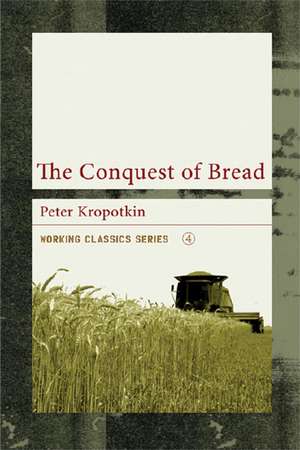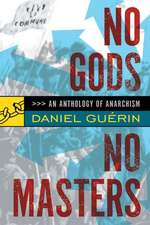The Conquest of Bread
Autor Peter Kropotkinen Limba Engleză Paperback – 31 iul 2008
| Toate formatele și edițiile | Preț | Express |
|---|---|---|
| Paperback (13) | 59.16 lei 3-5 săpt. | |
| CreateSpace Independent Publishing Platform – | 59.16 lei 3-5 săpt. | |
| Penguin Books – 24 iun 2015 | 63.06 lei 3-5 săpt. | +7.45 lei 7-13 zile |
| Ak Press – 30 ian 2025 | 80.64 lei 26-32 zile | +30.01 lei 7-13 zile |
| Digireads.com – 27 mai 2020 | 67.84 lei 6-8 săpt. | |
| AZILOTH BOOKS – 2 sep 2017 | 68.66 lei 6-8 săpt. | |
| Ancient Wisdom Publications – 15 mar 2017 | 75.20 lei 6-8 săpt. | |
| Lulu.Com – aug 2018 | 78.81 lei 6-8 săpt. | |
| COSIMO CLASSICS – 31 iul 2009 | 99.26 lei 6-8 săpt. | |
| Ak Press – 31 iul 2008 | 100.52 lei 6-8 săpt. | |
| Bibliotech Press – 6 ian 2020 | 109.70 lei 6-8 săpt. | |
| BLURB INC – 3 iul 2024 | 110.90 lei 6-8 săpt. | |
| Binker North – 29 feb 1892 | 112.41 lei 6-8 săpt. | |
| Book Jungle – 2 aug 2009 | 150.50 lei 6-8 săpt. | |
| Hardback (3) | 119.68 lei 3-5 săpt. | |
| JD Jackson – 14 iun 2019 | 119.68 lei 3-5 săpt. | |
| Lulu.Com – aug 2018 | 185.34 lei 6-8 săpt. | |
| Bibliotech Press – 7 ian 2020 | 193.19 lei 6-8 săpt. |
Preț: 100.52 lei
Nou
Puncte Express: 151
Preț estimativ în valută:
19.23€ • 20.14$ • 15.92£
19.23€ • 20.14$ • 15.92£
Carte tipărită la comandă
Livrare economică 05-19 aprilie
Preluare comenzi: 021 569.72.76
Specificații
ISBN-13: 9781904859109
ISBN-10: 1904859100
Pagini: 248
Ilustrații: black & white illustrations
Dimensiuni: 129 x 190 x 15 mm
Greutate: 0.34 kg
Editura: Ak Press
Colecția AK Press
Locul publicării:Edinburgh, United Kingdom
ISBN-10: 1904859100
Pagini: 248
Ilustrații: black & white illustrations
Dimensiuni: 129 x 190 x 15 mm
Greutate: 0.34 kg
Editura: Ak Press
Colecția AK Press
Locul publicării:Edinburgh, United Kingdom
Descriere
Peter Kropotkin's most extensive study of human needs and an outline of rational and equitable means of satisfying them.
Notă biografică
The fascinating story of a Russian prince-turned-anarchist, Peter Kropotkin (1842-1921). Kropotkin one of the world's first international celebrities. In England, Kropotkin was known as a brilliant scientist, famous for his work on animal and human cooperation, but Kropotkin's fame in continental Europe centered more on his role as a founder and vocal proponent of anarchism. In the United States, he pursued both passions. Tens of thousands of people followed ex-Prince Peter during two speaking tours in America.Kropotkin's path to fame was unexpected and labyrinthine, with asides in prison, breathtaking 50,000-mile journeys through the wastelands of Siberia, and banishment, for one reason or another, from most respectable Western countries of the day. In his homeland of Russia, Peter went from being Czar Alexander II's favored teenage page, to a young man enamored with the theory of evolution, to a convicted felon, jail-breaker and general agitator, eventually being chased halfway around the world by the Russian Secret police for his radical-some might (and did) say enlightened-political views.Both while in jail, and while on the run when he was entertaining and enlightening huge crowds, Kropotkin found the energy and concentration to write books on a dazzling array of topics: evolution and behavior, ethics, the geography of Asia, anarchism, socialism and communism, penal systems, the coming industrial revolution in the East, the French Revolution, and the state of Russian literature. Though seemingly disparate topics, a common thread-the scientific law of mutual aid, which guided the evolution of all life on earth-tied these works together. This law boils down to Kropotkin's deep-seated conviction that what we today would call altruism and cooperation-but what the Prince called mutual aid-was the driving evolutionary force behind all social life, be it in microbes, animals or humans. Today, anthropologists, political scientists, economists and psychologists publish hundreds of studies each year on human cooperation, and researchers in these fields are just beginning to realize that so many of the topics they are investigating were first suggested and promulgated by Peter Kropotkin.














![The Communist Manifesto [Manifesto of the Communist Party]](https://i1.books-express.ro/bt/9781614273561/the-communist-manifesto-manifesto-of-the-communist-party.jpg)









